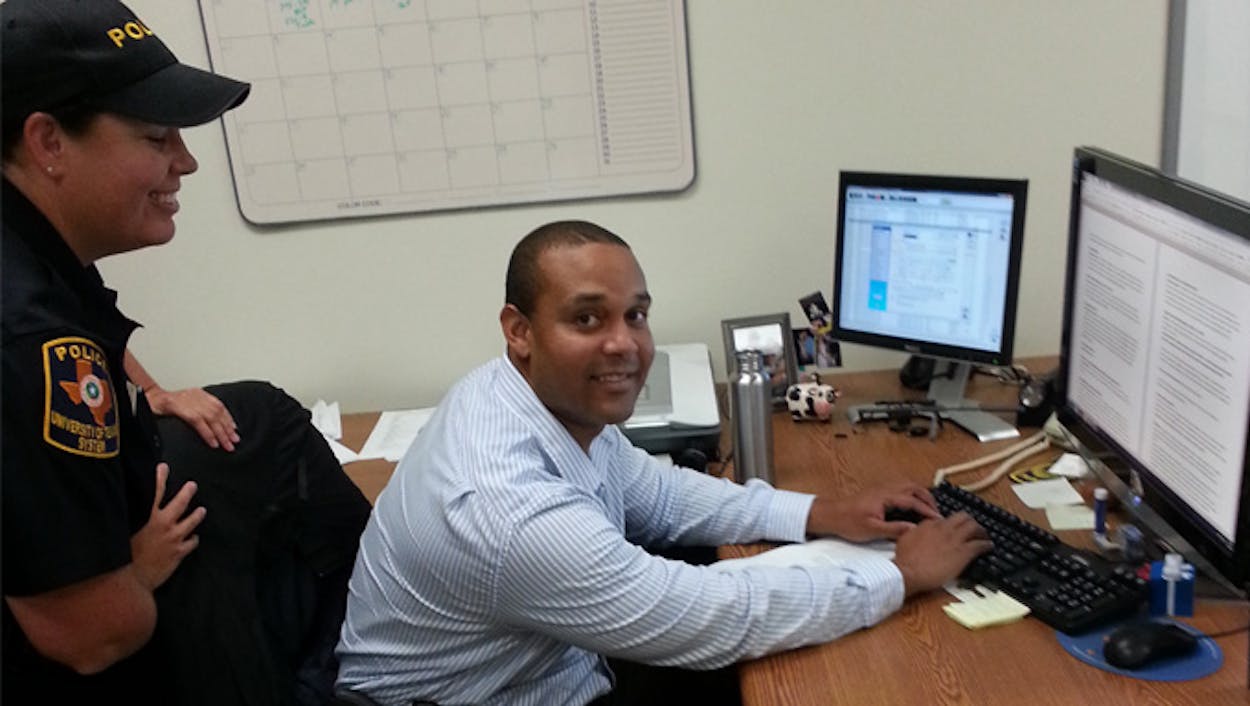It was probably the most-discussed crime on the University of Texas at Austin campus in 2012, and the culprit is still at large.
“MAIN BUILDING… Suspicious Person,” began the UT Police Department’s “Campus Watch” item of November 20, recounting a 2:41 a.m. break-in “through the ceiling” by a “masked non-UT subject” who the officers discovered “hanging onto the wall molding and a window blind.”
The suspect “refused to comply with the officers requests to come out with his hands up,” escaping through an open window despite attempts to placate him with Jack in the Box French fries. According to the blotter report, the offender was, “Three feet tall, last seen wearing a brown and black stripped [SIC] coat, furry gloves and black mask over his eyes.”
Such jocularity is why Campus Watch, which repackages the UTPD’s daily “commander’s report” of petty crime, public intoxication, and, apparently, the occasional animal trespasser, into a deadpan mix of just-the-facts and winking snark, has more than 15,000 readers.
The federal Clery Act requires universities to make their crime statistics public on annual basis, but the UTPD publishes Campus Watch almost every day.
“We wanted to give our students, staff, faculty and parents the ability to know what is happening on their campus yesterday, and what we’re dealing with here and now,” said Crime Prevention Unit Officer Layne Brewster (pictured above, left), a seventeen-year veteran of the UT force who is one of Campus Watch’s current authors.
What started as a more straightforward blotter by Sergeant William Van Horn in 1999 became more humorous around 2004 under Officers William Pieper and Darrell Halstead. Like many a news writer before them, they figured more people would read Campus Watch if they made it entertaining.
Over the years, Halstead became known for his catch-phrases and euphemisms, or, as he puts it, “the different ways to describe vomiting without saying ‘vomiting,’ or peeing on yourself without saying ‘peeing on yourself.’ ”
Some of his greatest feats of prose include, “personal splash zone;” “legendary four-legged stall creature;” “unidentified leafy green substance;” and the Shakespearean “having a ‘To Pee or Not to Pee’ moment.”
Sometimes even colleagues didn’t get the joke. A similar raccoon item from a few years ago got Halstead brought before the captain, who demanded to know why the officers involved in the report failed to arrest “the suspect.”
“I said, ‘Captain, you got to about halfway through it and just quit reading, didn’t you?,’” Halstead said.
While five different officers have written Campus Watch, this month is the first time since 2003 that Mr. Halstead will not be one of them. He and Pieper have both left the Crime Prevention Unit to go back on patrol; since July, the primary writer has been Officer Jimmy Moore (pictured above, right), an eleven-year veteran who is transferring in from accreditation.
“Honestly, I was a little nervous about writing the Campus Watch, just making sure I could keep it funny: keeping people informed and knowing what to put in and what not to put in,” Moore said.
But, added Brewster, “a lot of times, the reports write themselves. It’s just what people say and what they do.”
They also don’t pick and choose: all the crimes that are not currently being investigated make Campus Watch, whether they are funny or not. Sometimes readers email complaining that “there’s nothing but alcohol incidents.”
“We’re like, well, that’s what happened that weekend,” said Brewster.
And then there are the really good days, such as this past July 26, one of the early high points of Moore’s tenure.
“I need everyone to put their right arm straight up in the air, rotate 180 degrees, so your palm is facing the rear and slowly bend downward at the elbow until your palm reaches your back…then repeat!”
In other words, there were no crimes.
The Campus Watch officers take pride in their sense of humor, but their priority is still crime prevention, and the feature is just one part of Moore and Brewster’s job. Between them they do hundreds of presentations a year and tend to many other administrative tasks.
By using humor in Campus Watch, officers hope students learn larger lessons, like the fact that campuses are rife with petty criminals who will steal unlocked bikes or unattended computers and phones.
“Students–first-time people coming away to a larger town, they’re just very trusting,” Brewster said. “So we’re here to educate them. Some people learn the hard way.”
And of course, with the significant readership and propensity for students to share especially embarrassing items on social media, there is the increased likelihood that someone’s disorderly conduct will go viral across campus.







